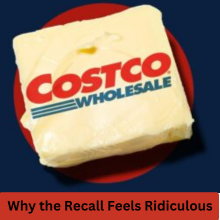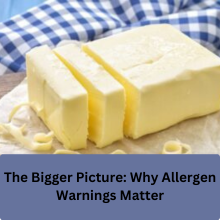
In a bizarre turn of events, Costco has found itself in the middle of a recall scandal over a very simple mistake—its butter label. What could possibly go wrong with something as basic as butter, right? Well, it turns out, a missing allergen warning for milk led to the recall of nearly 80,000 pounds of Costco’s Kirkland Signature Sweet Cream Butter. It’s a decision that has left many scratching their heads and social media buzzing with mockery. But before jumping to conclusions, let’s break down exactly what happened and why this recall seems a bit, well, ridiculous.
The Recall at a Glance: What Happened?
The recall, initiated in October 2023, affected both salted and unsalted versions of Kirkland Signature Sweet Cream Butter. According to the FDA, the packaging for the butter listed cream as an ingredient, but crucially failed to mention that the butter “Contains Milk”—an important allergen warning. While the butter itself is made from milk (of course), the lack of this simple label led to the recall of approximately 79,200 pounds of product.
What Exactly Went Wrong with Costco’s Butter?
The Labeling Issue: Missing the “Contains Milk” Warning
The problem seems to stem from one simple omission: the absence of the “Contains Milk” allergy warning on the packaging. Now, let’s be honest—who doesn’t know that butter contains milk? It’s literally butter. The absence of this allergen warning, however, became a big deal. The FDA flagged the product because milk is one of the top allergens responsible for the most severe reactions in the United States. In the case of someone with a milk allergy, consuming this butter could trigger an allergic reaction, ranging from mild symptoms like hives to more severe consequences such as anaphylaxis.
Why the Label Matters: The Importance of Allergen Information
Food labeling laws are in place for a reason. While many people may assume that butter contains milk, it’s essential for consumers with allergies to have clear, accurate, and complete labeling. The recall serves as a reminder that even something as commonplace as butter must adhere to strict allergen labeling standards.
Why the Recall Feels Ridiculous
Butter is Made from Milk—So Why the Confusion?
It’s hard not to laugh at the sheer absurdity of the situation. Butter, by definition, is made by churning cream from milk. In fact, butter is one of the most “milk-centric” food products out there. So, when news of the recall broke, many on social media found it hard to take seriously. Some people couldn’t understand how this could be a problem in the first place. “It’s butter,” many users quipped. It’s almost like recalling beef because it contains cow—completely obvious, right?
Social Media Reacts: The Ridicule and Humor
Of course, the internet had its say. The hashtag ButterGate went viral, and memes flooded social media platforms. Some users joked that the FDA should start labeling bread as “Contains Wheat,” while others sarcastically offered to take the butter off Costco’s hands for safe disposal. The most popular comment? “It’s butter!” The internet clearly couldn’t understand how something so trivial could lead to the recall of 80,000 pounds of food.
Was This Really Necessary?
For many, the recall seemed unnecessary. The missing allergen warning did pose a potential health risk for those with milk allergies, but many felt that a simple sticker or a quick revision of the label could have solved the problem without wasting perfectly good butter. Given that the recall wasn’t sparked by any reported illnesses, people began questioning whether the recall was an overreaction.
What the FDA Said About the Recall
The Official Statement from the FDA
The FDA’s statement was straightforward. They pointed out that milk is one of the top allergens in the U.S. and that any product containing milk must include a “Contains Milk” warning on its label. Their primary concern was consumer safety, as individuals with milk allergies could suffer serious health consequences if they consumed the butter unknowingly. While the recall didn’t stem from any reported illnesses, the FDA was obligated to act to prevent potential allergic reactions.
Why the FDA Takes These Recalls Seriously
The FDA isn’t in the business of making arbitrary decisions. Recalls, especially those involving allergens, are taken seriously because they can save lives. A single allergic reaction can lead to hospitalization or worse, so food safety remains a top priority. While it may seem like a small issue, the FDA’s vigilance helps ensure that consumers are protected from harmful food products.
The Bigger Picture: Why Allergen Warnings Matter
Milk Allergies and Serious Health Risks
Milk allergies can range from mild to severe, and they are among the most common allergies in children. In the U.S., approximately 2% of children under the age of 5 are allergic to milk, and the numbers are rising. For these individuals, consuming milk—even in small amounts—can cause reactions like stomach cramps, hives, swelling, or even anaphylaxis, which can be life-threatening.
Understanding Milk Allergies: A Quick Overview
Milk allergies occur when the immune system mistakenly identifies proteins in milk (like casein and whey) as harmful invaders. Unlike lactose intolerance, which is a digestive issue, a milk allergy can lead to much more severe reactions. This is why clear labeling is essential, particularly for products like butter that are staples in many households.
The Environmental and Economic Impact of the Recall
80,000 Pounds of Butter: A Waste of Resources?
One of the biggest concerns surrounding the recall is the environmental and economic waste it creates. 80,000 pounds of butter is no small amount. That’s a significant amount of food that is now being pulled off shelves and possibly wasted. The butter might be returned, destroyed, or disposed of, but either way, it’s a huge loss for both Costco and consumers.
What Happens to the Recalled Butter?
In cases like this, the recalled butter typically cannot be resold or reused. Often, it is returned to the manufacturer or destroyed, adding to the waste. This doesn’t only impact Costco’s bottom line, but it also raises questions about sustainability in food production and distribution.
Could Costco Have Avoided This?
The Role of Quality Control and Labeling Processes
The recall is a wake-up call for better quality control in labeling. Simple human errors, like missing an allergen warning, can have large consequences. Costco and other food companies need to take greater care in ensuring their products meet all labeling standards before they hit the shelves.
Could a Simple Sticker Have Solved the Problem?
Many people have pointed out that a quick fix, like adding a sticker with the “Contains Milk” warning, could have solved the problem. This would have allowed the butter to remain on shelves without causing panic or waste. It’s an easy solution that could have saved a lot of hassle.
A Deep Dive into Food Recalls and Why They Happen
The Rise of Food Recalls in the Past Decade
Food recalls have become more common in recent years, driven by tighter regulations and a greater awareness of food safety. While recalls are meant to protect consumers, they also highlight how easily mistakes can happen in the production and labeling processes.
How Do Recalls Impact Brands and Consumers?
Recalls can hurt a brand’s reputation and sales. For consumers, recalls can lead to confusion and loss of trust in a product. However, brands that handle recalls transparently and efficiently can recover and even strengthen their reputation.
The Online Backlash: Social Media’s Take
It’s Butter!”: How People Reacted
Social media quickly turned the Costco butter recall into a viral joke. While some people were frustrated by the recall, others found the entire situation absurd and humorous. “It’s butter!” became the rallying cry of those poking fun at the ridiculousness of the issue.
The Humor Behind the Ridicule
The humor wasn’t just about the butter; it was about how overly cautious and seemingly out-of-touch the recall process appeared to be. The internet’s quick-witted responses made it clear that people saw the whole thing as an overblown reaction to a simple mistake.
What Can Brands Learn from This Backlash?
The backlash highlights the need for brands to be transparent and prepared for scrutiny, especially when it comes to food recalls. The humor surrounding this recall shows that brands need to maintain a sense of perspective while also taking their responsibilities seriously.
Also read: Tesla Crushes Hedge Funds with $5B Loss – Full Breakdown
Alternatives to the Butter Recall Problem
The Case for Better Food Labeling
Clear and accurate food labeling is critical, not just for allergens but for all consumers. In the case of the Costco butter recall, a minor oversight in the labeling could have been avoided with a better process in place. Improved labeling can help reduce confusion and ensure consumer safety.
Could Technology Help Prevent These Issues?
Technology cold play a role in improving food safety. Automated systems could flag missing information on labels, or track production processes more accurately to ensure that labeling errors are caught early.
How Costco Could Recover from the Recall
Restoring Consumer Trust After a Food Recall
After such a public blunder, Costco will need to work hard to restore consumer trust. Transparency and clear communication are key. The company should ensure that future labeling mistakes don’t happen by improving its quality control processes.
The Importance of Transparency in Handling Recalls
The way Costco handles this recall can set a precedent for how they handle future issues. Transparency, prompt action, and customer support will help them minimize the negative effects of this recall on their reputation.
Also read: GSK Leaves BIO in 2025: Why Biotech Giants Are Leaving
Conclusion
While the Costco butter recall may seem like a case of “butter stupidity,” it’s important to remember that even small mistakes can have big consequences. The recall highlights the critical importance of accurate labeling and the potential risks associated with allergens. As consumers, we expect clear information, and brands like Costco have a responsibility to deliver that. The recall, though seemingly ridiculous, serves as a reminder of the importance of safety, even with the most basic products.
FAQs
Why was Costco forced to recall the butter?
Costco had to recall the butter because the label failed to include the “Contains Milk” allergen warning, which is mandatory for milk-based products.
What allergens were not listed on the butter’s packaging?
The butter packaging failed to mention milk, a primary allergen, which is crucial for people with milk allergies.
Can you still return the recalled butter to Costco?
Yes, customers can return the affected butter for a full refund or dispose of it as instructed by Costco.
How serious are milk allergies?
Milk allergies can cause serious reactions, including anaphylaxis, which can be life-threatening if not treated immediately.
What can consumers do to ensure the safety of food products?
Consumers should always check food labels for allergens and other important information. If unsure, it’s best to contact the manufacturer or retailer for clarification.


